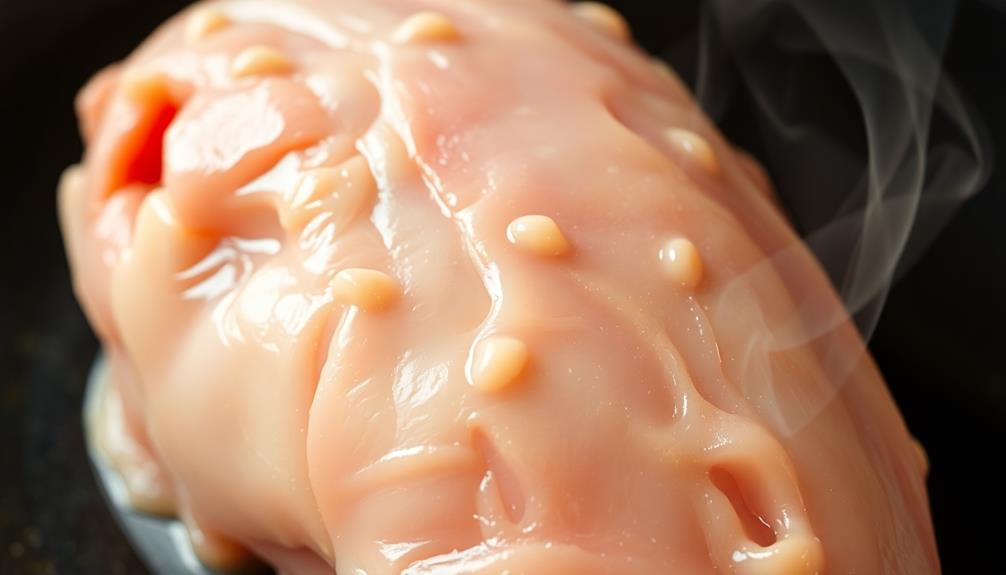Spoiled chicken smells really bad, often giving off strong, unpleasant odors. You might notice sour or ammonia-like scents, which hint at bacterial growth. Sometimes, it can smell fishy or like rotten eggs too. Fresh chicken, on the other hand, has a mild or even no smell at all. If you catch any foul odors, it's best to toss the chicken immediately to stay safe. These smells arise from protein breakdown and bacteria, making it crucial to trust your nose. Want to uncover more fascinating facts about food safety? Hang tight for some useful tips!
Key Takeaways
- Spoiled chicken emits strong, unpleasant odors that are a clear indicator of spoilage.
- A sour or ammonia-like smell suggests bacterial growth and unsafe chicken.
- Fishy or sulfur-like odors indicate potential bacterial activity in both raw and cooked chicken.
- Fresh chicken typically has a mild or absent smell, while strong odors indicate it is unsafe to consume.
- Trusting your sense of smell is crucial; any foul odor means immediate disposal is necessary for health safety.
Introduction
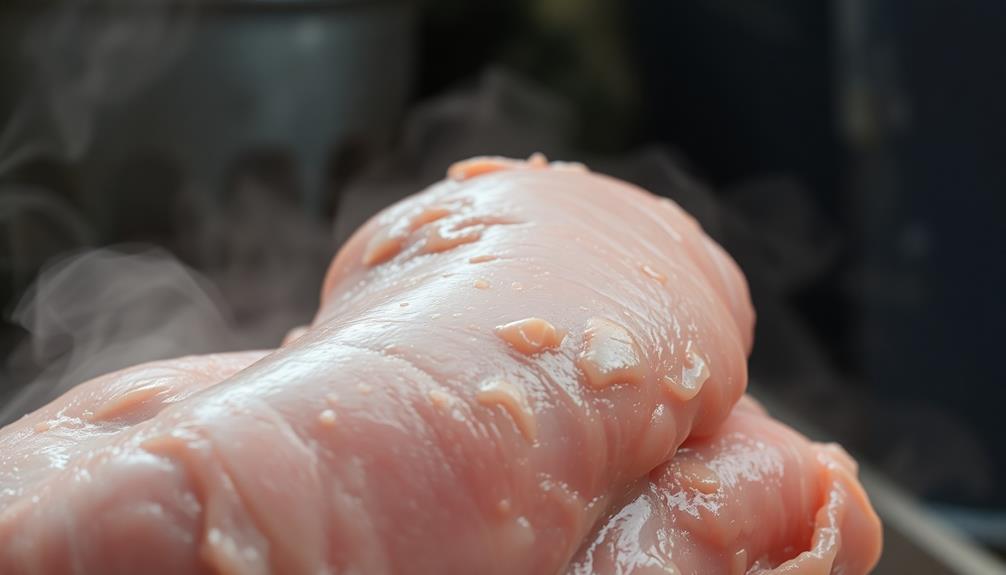
When it comes to chicken, understanding the signs of spoilage is crucial for your health. You might think that chicken is safe as long as it looks fine, but the smell can tell you a different story. Spoiled chicken often gives off strong, unpleasant odors that you shouldn't ignore. If you notice a sour or ammonia-like smell, it's a clear sign that bacteria have started to grow. Fresh chicken usually has a mild or no smell at all, so any pungent odor is a red flag.
Fishy or sulfur-like smells are also indicators of spoilage. These odors can appear in both raw and cooked chicken, so always do a smell test before you decide to consume it. If you detect any unpleasant odors, it's best to throw that chicken away. Eating spoiled chicken can be unsafe and lead to foodborne illnesses.
Description of the Smell
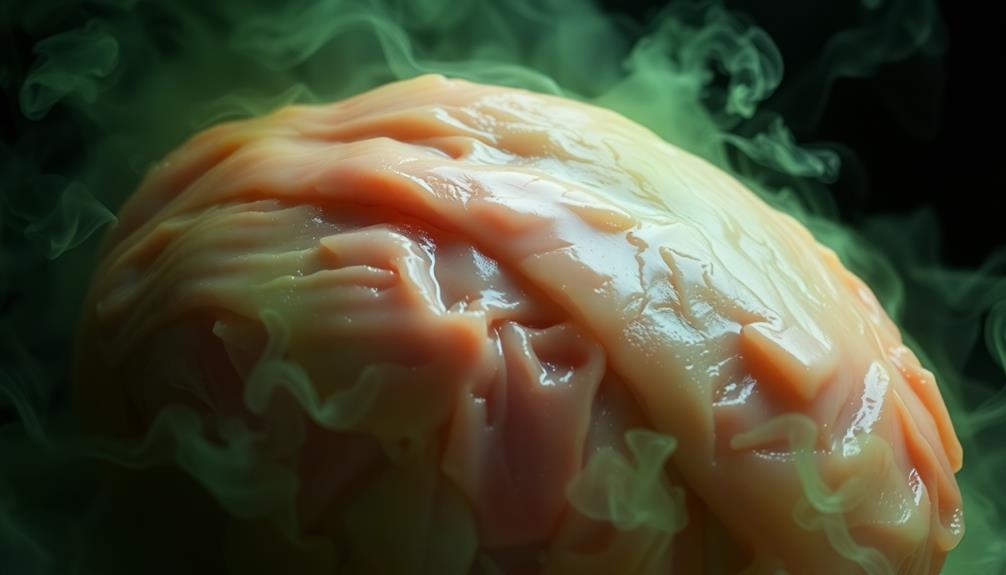
Spoiled chicken typically emits a range of strong, unpleasant odors that signal its unsafe condition. When you perform the smell test, be alert for any foul odor. Fresh chicken has little to no smell, while spoiled chicken may give off a sour smell that's hard to ignore.
If you detect a fishy smell or a sulfur-like smell, it's a clear sign of spoilage, suggesting bacterial growth. You might also notice an aroma resembling rotten eggs. This off-putting aroma means it's time to take action.
Even if cooked chicken looks fine, a sour or strange smell is a warning sign. Always trust your nose! If any unpleasant smells come from your raw or cooked chicken, it's crucial to discard the meat immediately.
Consuming spoiled chicken can lead to serious health risks, so it's better to be safe than sorry. Remember, these smells are your body's way of telling you something's not right.
Always keep your kitchen safe by being vigilant about these signs of spoilage. With these tips in mind, you'll protect your health and enjoy your meals without worry!
Source and Composition
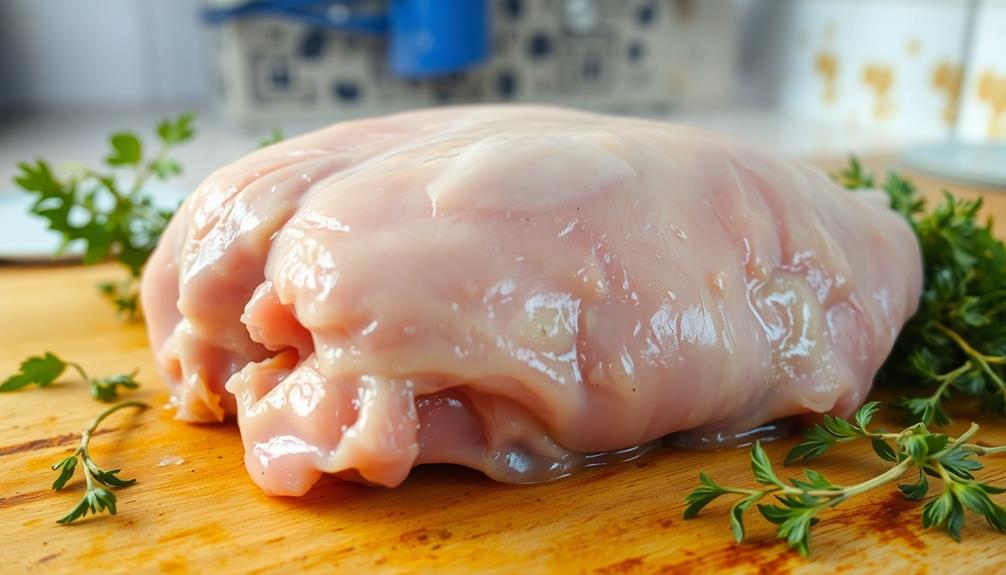
The unpleasant smell of spoiled chicken primarily comes from the breakdown of proteins and the growth of bacteria, such as Salmonella and Campylobacter. When chicken spoils, it often emits strong, unpleasant odors that can be described as sour or ammonia-like. This is due to the production of volatile compounds that bacteria create as they multiply and decompose the meat.
Fresh chicken has a mild or almost no smell, but once spoilage occurs, it releases sulfur compounds that contribute to the foul scent you might notice. These off-putting smells are important clues that help you identify spoiled chicken. Even if you don't see any visible signs of spoilage, trust your nose! Spoiled chicken can sometimes carry a unique, pungent aroma often likened to a “dead rat odor description,” which is unmistakably unpleasant. This intense, rancid smell is a strong indicator that the chicken is no longer safe to consume. If you detect anything close to this level of stench, it’s best to discard the chicken immediately, as cooking will not eliminate the risks posed by harmful bacteria.
The intensity of the odor can vary based on how spoiled the chicken is, but any strong odor should signal that the chicken is unsafe to consume.
Typical Scenarios or Environments

Improper storage often leads to the development of foul odors in chicken, signaling spoilage. When you leave chicken out at room temperature for more than two hours, you create the perfect environment for bacterial growth. This results in a strong, unpleasant odor that can remind you of rotten eggs or sulfur.
If your kitchen has high humidity, spoilage can happen even faster, causing the chicken to develop a sour smell.
Thawing chicken improperly can also lead to issues. For instance, if you leave it on the counter, it might develop a fishy or ammonia-like smell, which means it's unsafe to eat. Always remember to thaw chicken in the fridge or in cold water for safety.
As chicken approaches its expiration date, watch for any off smell or metallic odor, indicating it's on the verge of going bad.
Keeping chicken stored properly is key to enjoying safe and delicious meals. So, always check the smell and ensure you store chicken in a cool, dry place to avoid these unpleasant situations.
Stay safe and happy cooking!
Emotional or Cultural Associations
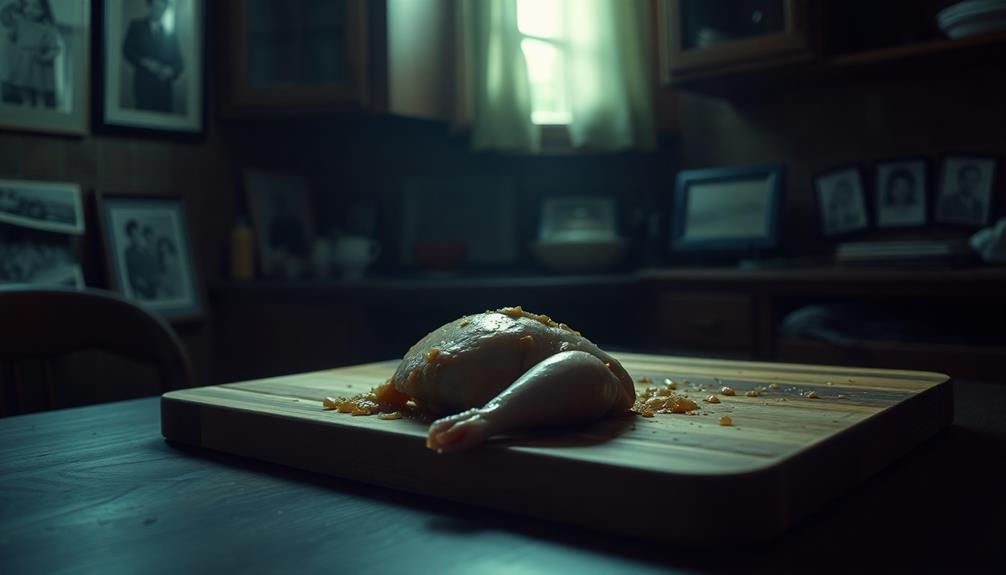
Disgust often washes over you when encountering the smell of spoiled chicken, a visceral reaction deeply rooted in cultural perceptions of food safety. This strong, sulfur-like aroma can bring to mind decay and uncleanliness, reminding you of the importance of fresh ingredients in culinary traditions.
In many cultures, the smell of chicken should evoke warmth and comfort, but spoiled chicken represents a breach of these values. You might associate foul odors with negative experiences, like foodborne illness, which can make cooking chicken feel scary in the future.
The recognition of these unpleasant smells serves as a collective learning experience, teaching everyone about proper food handling and storage methods. Aroma plays a vital role in determining freshness, and spoiled chicken's unpleasant smell acts as a cautionary tale passed down through generations.
When you encounter this scent, remember that it carries lessons about food safety. Embracing these cultural narratives helps reinforce the need to respect the food we prepare and consume. Ultimately, the smell of spoiled chicken serves as a powerful reminder of the importance of keeping our kitchens safe and our meals fresh.
Health or Safety Considerations
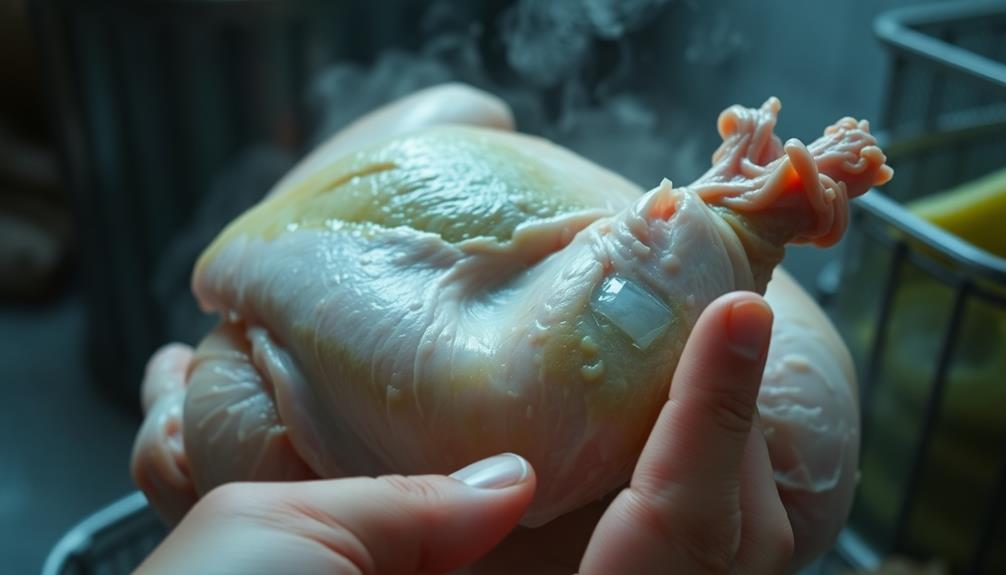
How can you ensure your chicken is safe to eat? First, always pay attention to any unpleasant odors. Spoiled chicken often smells sour, ammonia-like, or even like rotten eggs. These strong odors signal bacterial growth and could mean the chicken is unsafe to consume. Fresh chicken should have minimal to no smell, so if you notice anything off-putting, it's a clear warning sign.
Be cautious! Spoiled chicken can harbor harmful bacteria like Salmonella and Campylobacter. Eating contaminated chicken can lead to foodborne illness, causing symptoms such as nausea, vomiting, diarrhea, and fever. These symptoms can vary based on your health, so it's best to avoid the risk altogether.
If you ever detect those bad smells, don't hesitate—discard it immediately. It's better to be safe than sorry. Protecting your health is essential, and paying attention to what you eat will keep you and your loved ones safe.
Final Thoughts
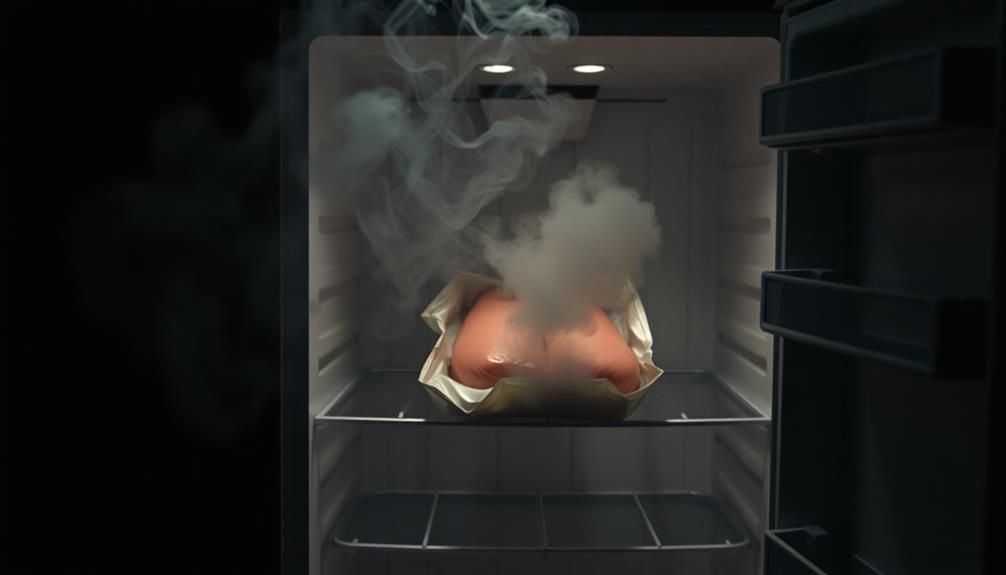
In conclusion, paying attention to the smell of chicken is crucial for ensuring your safety and health. If you ever notice that your chicken has gone bad, it's important to act quickly. Spoiled chicken often gives off strong, unpleasant odors—think sour, ammonia-like, or even a funky odor that reminds you of rotten eggs. Fresh chicken typically has a mild or no smell at all.
When you sense these bad chicken smells, trust your sense of smell! This is one of the best signs of spoilage. If you detect any foul odors, it's safest to discard it immediately. Remember, consuming spoiled chicken can lead to serious foodborne illnesses, which you definitely want to avoid.
Always check for these signs of spoilage, whether your chicken is raw or cooked. If it doesn't smell safe to eat, don't take any chances. Your health is worth it!
Frequently Asked Questions
What Does Slightly Spoiled Chicken Smell Like?
When chicken starts to spoil slightly, you might notice a faint sour smell, akin to ammonia or spoiled eggs. If it smells off or different, it's best to discard it to avoid any risk.
Is It Okay to Eat Chicken That Smells a Little?
You shouldn't eat chicken that smells even a little off. It's better to be safe than sorry. If you detect an unpleasant odor, just toss it to avoid any risk of foodborne illness.
How to Know if Chicken Has Gone Bad?
To know if chicken's gone bad, trust your senses. Look for slimy texture, discoloration, or strong odors. If anything seems off, it's safer to discard it rather than risk foodborne illness. Stay cautious!
What Happens if You Cook Spoiled Chicken?
If you cook spoiled chicken, you risk foodborne illness. Even cooking won't eliminate harmful bacteria or toxins. It'll likely taste awful and smell bad, so it's best to throw it away instead of trying to salvage it.
